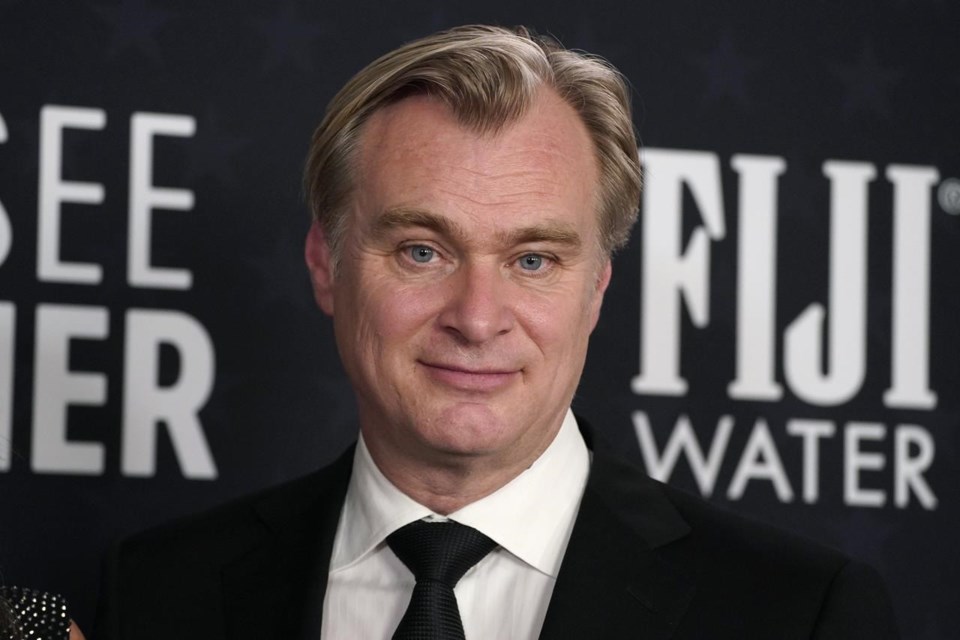UNIVERSAL CITY, Calif. (AP) — Christopher Nolan has, by any account, had a banner year with “Oppenheimer.” But “Tenet” was still on his mind.
The palindromic spy thriller starring John David Washington and Robert Pattinson was released at a tricky time during the pandemic, when many theaters were open internationally but not yet in New York and Los Angeles. And all those IMAX 70mm and 70mm film prints, which proved so immensely popular with audiences for “Oppenheimer,” were just sitting around.
“It’s a film that was designed, almost more than any I’ve made, to be enjoyed in this form,” Nolan told The Associated Press. “When I heard they were going to be making film prints on ‘Dune: Part Two,’ I jumped at that and thought what if we opened up the week before? We can dust off the projectors.”
Nolan showed one to Warner Bros. film chiefs Pam Abdy and Michael De Luca, and “they got it.”
Beginning Feb. 23, “Tenet” will be back in theaters, in Nolan’s favorite format.
Longtime friends, Nolan and Denis Villeneuve spoke to the AP last week, outside of a sold out showing of the re-release, about “Tenet,” “Dune: Part Two,” and the sense that, a decade after Kodak almost stopped making film altogether, movie audiences are embracing and rallying around film too.
Below are excerpts from the conversation, which has been edited for clarity and brevity.
AP: I spoke to people who held off on seeing “Tenet” entirely, holding on to the hope that it would get a proper re-release.
NOLAN: For me, living in Los Angeles, I never got to see it with an audience. It came to streaming first here, so this is a really fun opportunity to get it in front of people the way it was intended. The thing with “Tenet” is, I think of all the films I have made, it’s the one that’s very much about the experience of watching films. It’s about watching spy movies in a way. It tries to build on that experience and take it to this very magnified, slightly crazy place. A lot of that is about sound and music and this huge image.
More than any film I’ve made, “Tenet” was designed to have this very theatrical, IMAX, larger than life identity.
AP: “Dune: Part Two” was shot on IMAX digital but will be shown in film. Can you explain how this works?
VILLENEUVE: It was not planned that I would get an IMAX film release. It was a bit like a gift from life, the movie being delayed because of the strikes. Someone came with the idea to try it. They mentioned this once and then I was like a dog not letting it go. The idea to experiment, and, frankly, Chris will say “cheat” because…
NOLAN: I wasn’t going to say that!
VILLENEUVE: But still, I left film a long time ago. Or, I didn’t leave film, film left me and my heart was broken.
NOLAN: Film wants you back.
VILLENEUVE: I’m flirting with the idea, Chris Nolan.
I cannot give numbers, but I know that many of the pre-sales for “Dune: Part Two” are in 70mm. There’s the notion of an event and that is something people are starving for, they are craving it.
NOLAN: As filmmakers we’re competing with incredible home technology. We have to raise our game, but it’s great to see a new generation seeing what the difference is. There’s an emotional response to it that I think is very hard to quantify. It’s hard to justify to the studio sometimes. So it’s wonderful when they look at the numbers and they see that they sell more tickets that way, because audiences get something.
VILLENEUVE: The idea to put “Dune” on film didn’t come from me, to be honest. It came from Warners.
NOLAN: I’m admitting nothing, but we might have pointed out to them some of the numbers that we made.
VILLENEUVE: It always ends up being about the money.
NOLAN: I just like hearing the guy who made “Dune Two” be like “it’s all about money.” I’ve seen that film. That’s not a cheap film, my friend.
VILLENEUVE: I have a question for you Chris. You must have strong shoulders because you were able to keep film alive by yourself. You’re pretty stubborn, my friend, but was there a moment where you felt a bit alone?
NOLAN: Emma was always on the exact same page. I think it would have been very hard if my producing partner hadn’t understood it the same way I understood it, emotionally. I’ve never felt on my own because it was always at least the two of us together. (But) there was a strange feeling of, hang on, how can it come down to this? We’ve achieved this incredible goal to be able to make films on a large scale, surely they won’t take the tools away at the last minute.
VILLENEUVE: I think that’s the way movies will survive. Large formats, like IMAX more precisely, is definitely the future of cinema because you cannot reproduce that at home. Not even in your home.
NOLAN: Well, mine’s pretty good (laughs).
VILLENEUVE: Yours is the BEST. But it’s not IMAX.
Lindsey Bahr, The Associated Press



